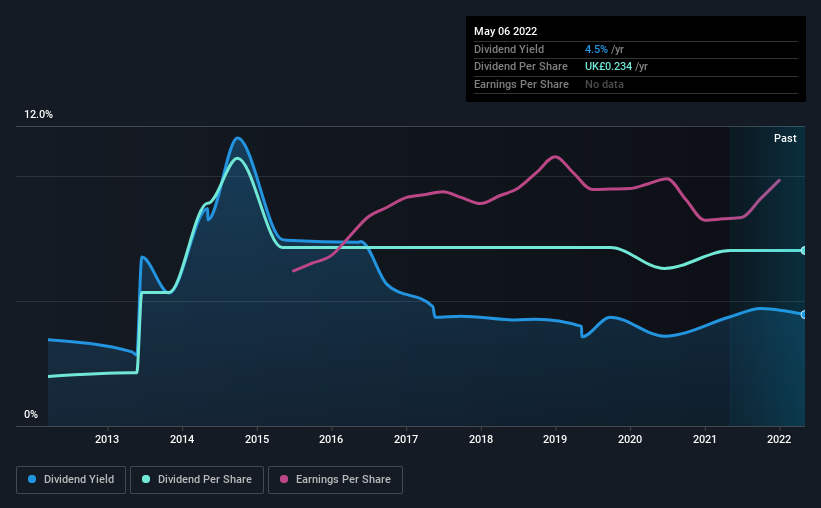- United Kingdom
- /
- Trade Distributors
- /
- AIM:ASY
Andrews Sykes Group (LON:ASY) Is Increasing Its Dividend To UK£0.13
Andrews Sykes Group plc (LON:ASY) has announced that it will be increasing its dividend on the 17th of June to UK£0.13, which will be 8.7% higher than last year. This will take the dividend yield from 4.5% to 4.6%, providing a nice boost to shareholder returns.
Check out our latest analysis for Andrews Sykes Group
Andrews Sykes Group's Dividend Is Well Covered By Earnings
If the payments aren't sustainable, a high yield for a few years won't matter that much. The last dividend was quite easily covered by Andrews Sykes Group's earnings. This means that a large portion of its earnings are being retained to grow the business.
Looking forward, earnings per share could rise by 1.5% over the next year if the trend from the last few years continues. If the dividend continues on this path, the payout ratio could be 64% by next year, which we think can be pretty sustainable going forward.

Dividend Volatility
While the company has been paying a dividend for a long time, it has cut the dividend at least once in the last 10 years. Since 2012, the first annual payment was UK£0.066, compared to the most recent full-year payment of UK£0.23. This means that it has been growing its distributions at 13% per annum over that time. Despite the rapid growth in the dividend over the past number of years, we have seen the payments go down the past as well, so that makes us cautious.
The Dividend's Growth Prospects Are Limited
Growing earnings per share could be a mitigating factor when considering the past fluctuations in the dividend. However, Andrews Sykes Group's EPS was effectively flat over the past five years, which could stop the company from paying more every year. Growth of 1.5% may indicate that the company has limited investment opportunity so it is returning its earnings to shareholders instead. This isn't bad in itself, but unless earnings growth pick up we wouldn't expect dividends to grow either.
Our Thoughts On Andrews Sykes Group's Dividend
In summary, it's great to see that the company can raise the dividend and keep it in a sustainable range. While the payout ratios are a good sign, we are less enthusiastic about the company's dividend record. Taking all of this into consideration, the dividend looks viable moving forward, but investors should be mindful that the company has pushed the boundaries of sustainability in the past and may do so again.
Investors generally tend to favour companies with a consistent, stable dividend policy as opposed to those operating an irregular one. Still, investors need to consider a host of other factors, apart from dividend payments, when analysing a company. Case in point: We've spotted 2 warning signs for Andrews Sykes Group (of which 1 doesn't sit too well with us!) you should know about. If you are a dividend investor, you might also want to look at our curated list of high yield dividend stocks.
New: Manage All Your Stock Portfolios in One Place
We've created the ultimate portfolio companion for stock investors, and it's free.
• Connect an unlimited number of Portfolios and see your total in one currency
• Be alerted to new Warning Signs or Risks via email or mobile
• Track the Fair Value of your stocks
Have feedback on this article? Concerned about the content? Get in touch with us directly. Alternatively, email editorial-team (at) simplywallst.com.
This article by Simply Wall St is general in nature. We provide commentary based on historical data and analyst forecasts only using an unbiased methodology and our articles are not intended to be financial advice. It does not constitute a recommendation to buy or sell any stock, and does not take account of your objectives, or your financial situation. We aim to bring you long-term focused analysis driven by fundamental data. Note that our analysis may not factor in the latest price-sensitive company announcements or qualitative material. Simply Wall St has no position in any stocks mentioned.
About AIM:ASY
Andrews Sykes Group
An investment holding company, engages in the hire, sale, and installation of environmental control equipment in the United Kingdom, Rest of Europe, the Middle East, Africa, and internationally.
Flawless balance sheet, good value and pays a dividend.
Market Insights
Community Narratives




